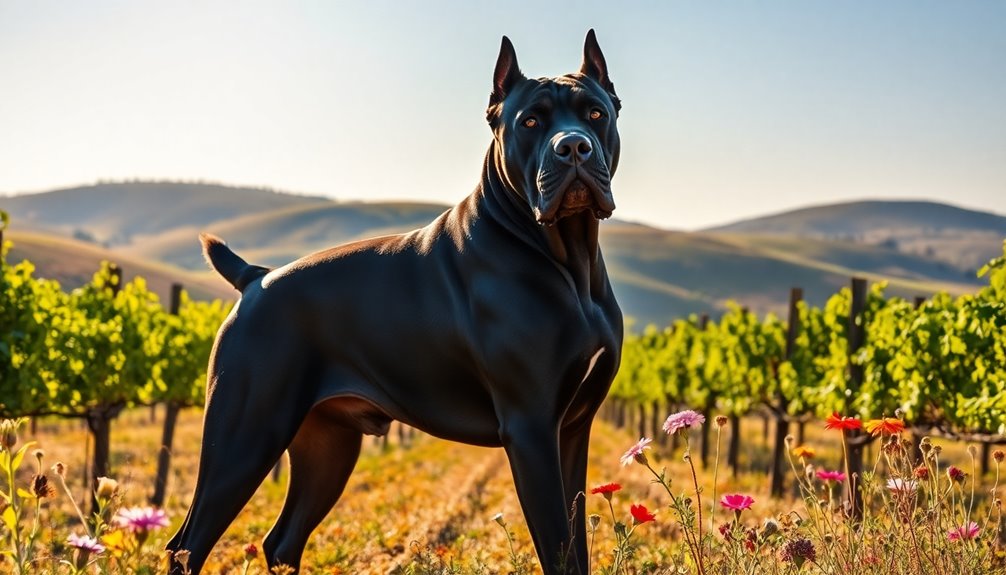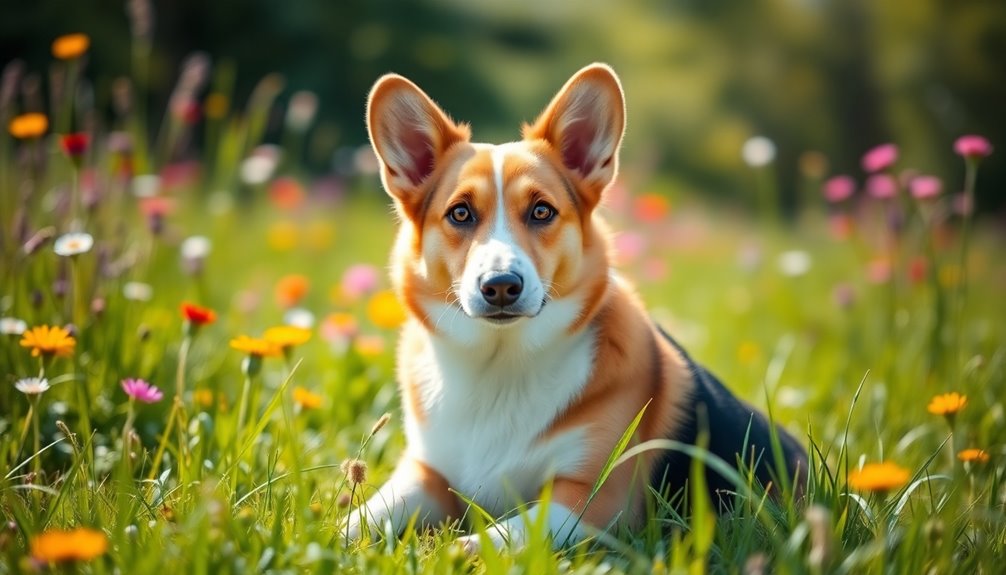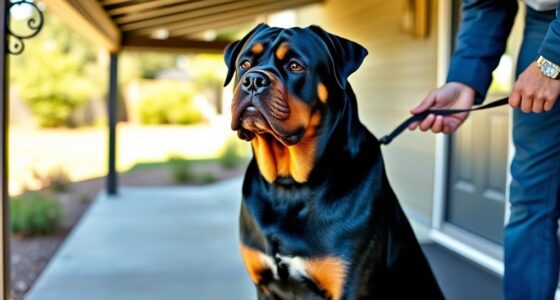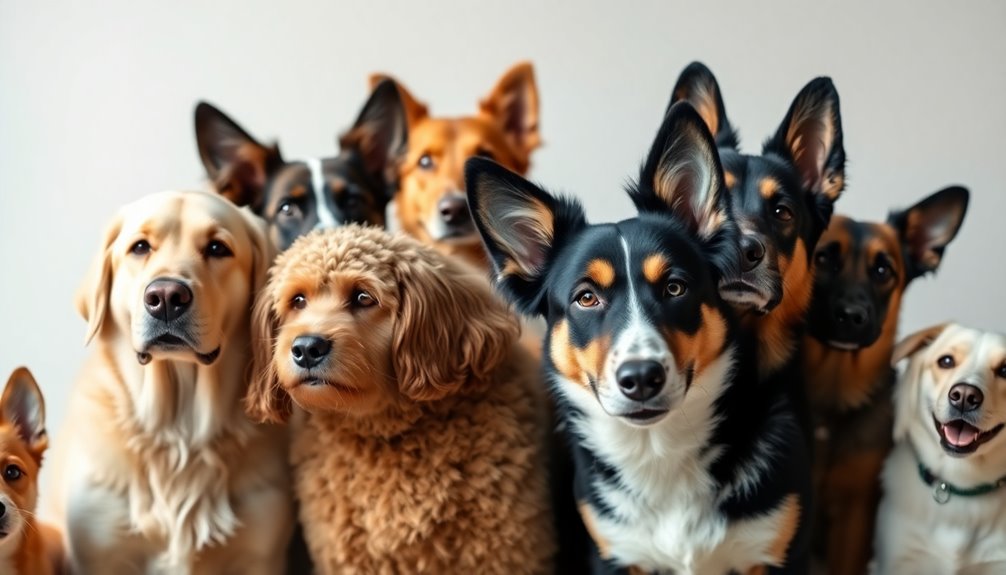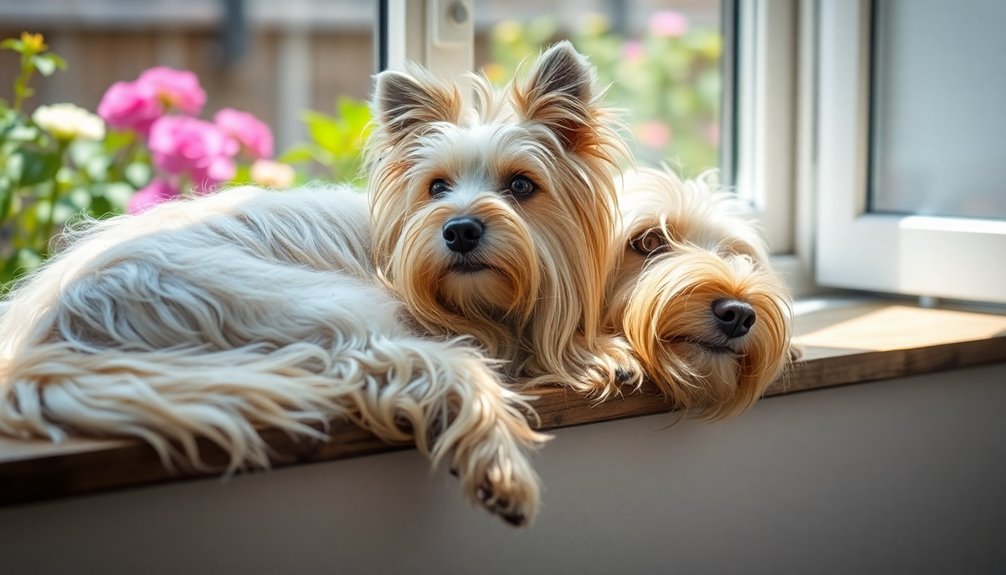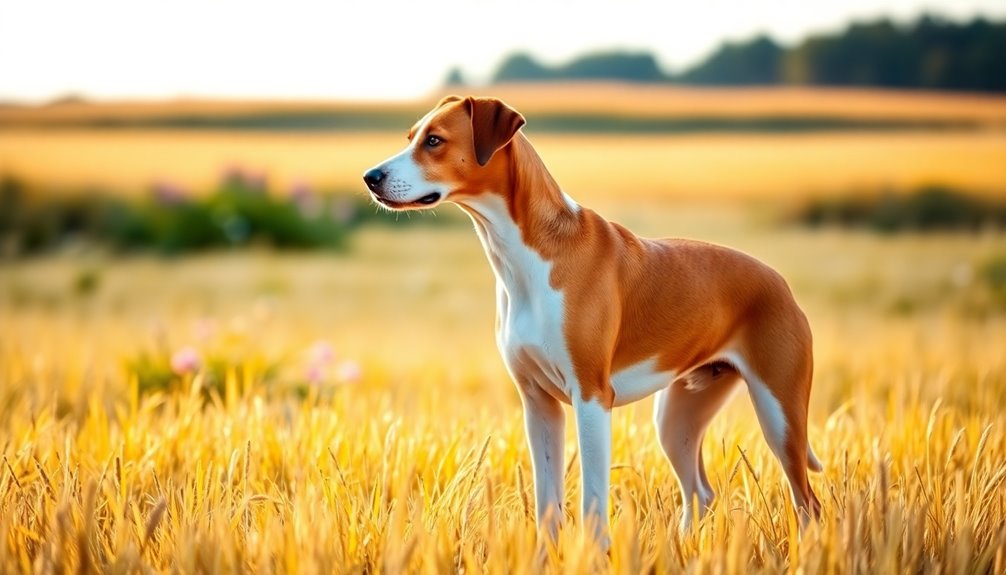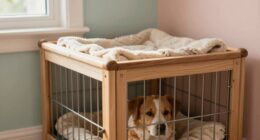The Cane Corso is a powerful Italian guardian, known for its impressive stature and fierce loyalty. Males generally weigh between 90 and 110 pounds, while females range from 88 to 99 pounds. With a bite force that can exceed 400 PSI, this breed is both strong and protective. Early socialization is key to helping them develop a well-adjusted temperament. They thrive in spacious environments and need regular exercise—about 1 to 2 hours daily. Caring for a Cane Corso involves attention to health, grooming, and training. Explore more about their unique needs and characteristics to ensure a harmonious life together.
Key Takeaways
- Cane Corsos are loyal and protective dogs, requiring early socialization and training to ensure well-adjusted behavior.
- They have a muscular build, with males weighing 110-140 pounds and females 85-115 pounds, showcasing impressive strength and agility.
- Their lifespan averages 9 to 12 years, with common health concerns including joint issues and neurological conditions that require regular veterinary care.
- Ideal living conditions include a spacious, fenced backyard, and they need 1 to 2 hours of daily exercise to stay healthy and engaged.
- The breed's short, dense coat requires minimal grooming, with brushing 3 to 4 times a week and daily during shedding seasons.
Introduction
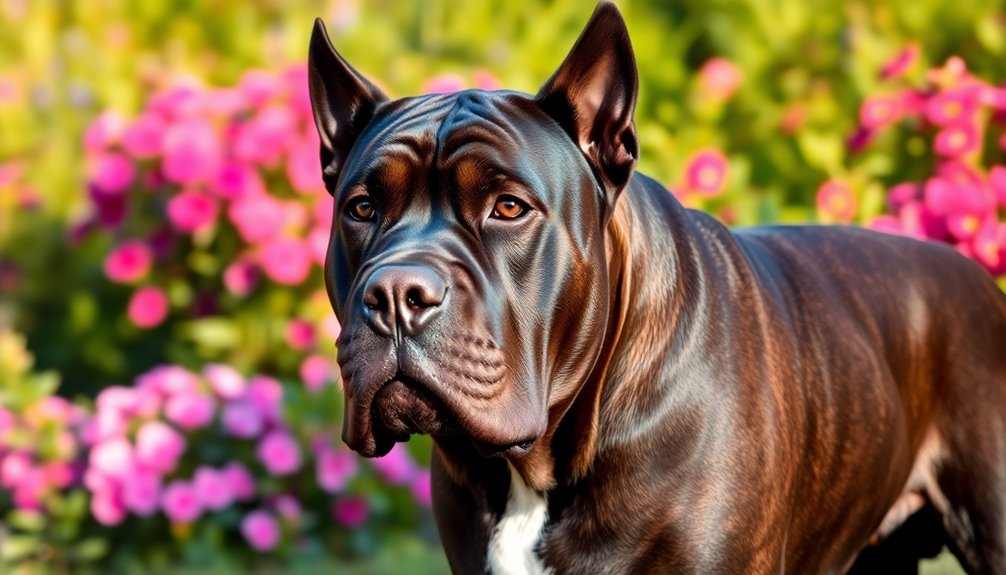
The Cane Corso commands attention with its impressive stature and loyal demeanor. Standing between 25 and 27.5 inches at the shoulder for males and 23.5 to 26 inches for females, these dogs are both powerful and graceful. Weighing between 90-110 pounds for males and 88-99 pounds for females, their robust frame is complemented by a short, dense coat that comes in colors like black, gray, fawn, red, and brindle. Known for their fierce loyalty and protective instincts, Cane Corsos thrive on companionship and form deep bonds with their families. They're intelligent and trainable, responding well to positive reinforcement, but they also have a confident and independent streak that requires consistent leadership. Additionally, the breed's name, derived from Latin origins, reflects their historical role as guardians.
Early socialization is crucial to ensure they're well-adjusted and friendly towards strangers and other animals. While their health can be an issue, with potential concerns like hip dysplasia and bloat, regular vet check-ups, a balanced diet, and exercise can keep them fit. With minimal grooming needs, a Cane Corso is a striking and devoted guardian for those ready to embrace their unique personality.
History and Origin
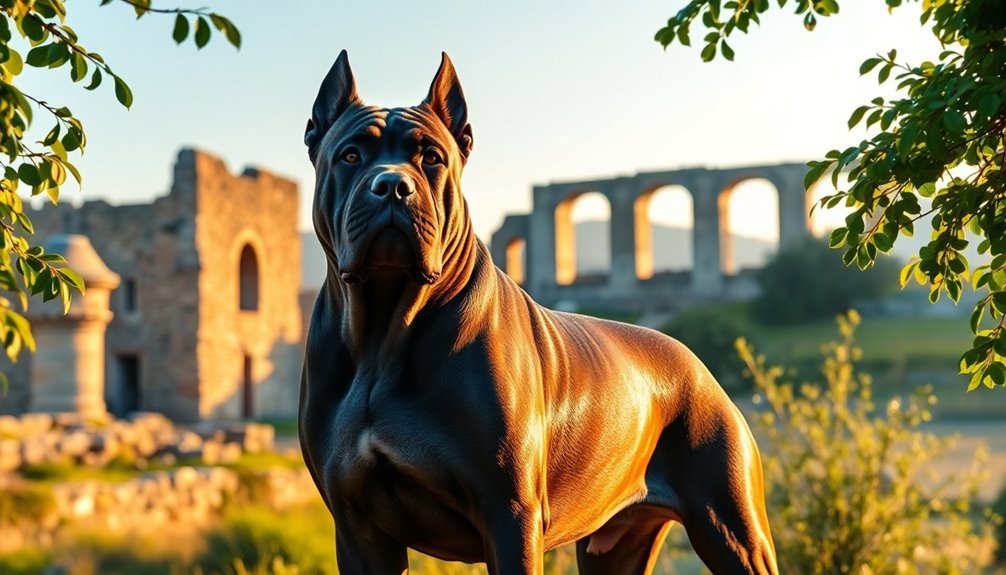
The Cane Corso has ancient roots that trace back to the Molossians of Mesopotamia, where it was originally bred for guarding livestock and property.
As you explore its history, you'll see how this breed evolved from fierce warriors in Roman battles to protectors of farms and homes. This breed's adaptability to various roles reflects its historical significance in both agriculture and protection.
Understanding these origins gives you a deeper appreciation for the Cane Corso's loyalty and protective nature today.
Where and when the breed originated
Originating from the ancient Roman Molossian, specifically the "Canis Pugnax," Cane Corsos have a rich history that dates back to the time of the Romans.
These dogs descended from the Greek Molossus and were later bred with other Roman and Italian breeds. The lighter version of the Molossian ultimately evolved into the Cane Corso, while the heavier variant gave rise to the Neapolitan Mastiff.
During their heyday, Cane Corsos served multiple roles. They were auxiliary warriors in Roman wars, showcasing courage and loyalty. Additionally, they hunted large game such as boar and bear, and they thrived as companions and guardians on farms in rural areas. Their versatility even saw them participating in circus games, including those staged at the Colosseum. This breed's historical significance is rooted in their ability to adapt to various roles in human environments.
Sadly, after World War II, the breed faced a significant decline due to diminished working needs, nearly reaching extinction by the 1960s.
However, dedicated enthusiasts revitalized the Cane Corso in the 1970s, leading to its recognition in Italy and beyond.
Today, this remarkable breed is celebrated for its lineage and steadfast character, making it a favorite among dog lovers.
Guarding Livestock and Property
Throughout history, Cane Corsos have stepped up as formidable guardians of livestock and property, particularly in the rural landscapes of post-Roman Italy. After the Roman Empire's decline, these dogs became essential on farms and pastures, protecting livestock from predators and thieves. Their strength and agility made them valuable cattle drovers, guiding animals to markets and slaughterhouses. Additionally, they are descendants of Canis Pugnax, a Roman War dog, which highlights their historic role as protectors.
Cane Corsos also showcased their hunting prowess, participating in large game hunts for wild boar, stag, and bear. With their loyalty and wariness of strangers, they excelled as watchdogs, safeguarding families from various threats. Their protective instincts are instinctual, often willing to defend their owners with their lives while maintaining a calm demeanor to assess situations.
Social and economic changes, including the decline in big game hunting, shifted their roles primarily to farms. Post-World War II, their population dwindled, but dedicated breeders revived the breed in the mid-1970s.
Physical Characteristics

When you look at a Cane Corso, you can't help but notice its impressive size and muscular build. Males typically stand between 25 to 27.5 inches tall and weigh up to 110 pounds, while females are slightly smaller. With a broad chest and a thick, double-layered coat, this breed exudes strength and presence. Their strong bonds with families and protective instincts make them not just formidable guardians but also devoted companions.
Size, weight, and coat details
Cane Corsos are impressive dogs, standing at heights between 25 to 27.5 inches for males and 23.5 to 26 inches for females. Some sources may list a slightly broader range, indicating heights of 25 to 28 inches for males and 23.5 to 26 inches for females.
You'll measure their height at the withers, the highest point of their shoulder blades.
In terms of weight, adult male Cane Corsos typically weigh between 110 to 140 pounds, while females usually range from 85 to 115 pounds. Other sources narrow the male weight to 99-110 pounds and females to 85-99 pounds. Weight can vary due to age, genetics, and overall health. Proper nutrition and regular vet check-ups are essential for maintaining a healthy weight.
The Cane Corso sports a short, smooth coat about 1/3 to 1/2 inch long. It should be stiff, shiny, and adherent without any tufts or oily patches.
This breed comes in various colors, including black, gray, fawn, and brindle patterns, each showcasing its unique beauty.
Muscular Build and Broad Chest
The Cane Corso's impressive stature is complemented by its muscular build and broad chest, which are defining features of the breed. You'll notice their wide and deep chest, a hallmark that not only enhances their imposing appearance but also supports their strong, athletic nature.
The breed's wide skull and wrinkly forehead add to their distinctive look, while their floppy ears contribute to their overall charm.
Cane Corsos are known for their strongly muscled bodies, reflecting their historical roles in protection and work. This functional muscle is vital, especially since the breed is highly athletic, excelling in dog sports like tracking and agility.
However, you must remember that their size and muscular structure can make them prone to joint issues, such as hip dysplasia. It's crucial to avoid high-impact exercises until they fully develop around 18 months. Gradual increases in exercise can help manage their energy levels without risking joint damage.
To maintain their muscular build, a balance of physical and mental stimulation is essential. Engaging activities like brisk walks, hiking, and puzzle toys will keep your Cane Corso healthy and happy.
Proper nutrition and gradual exercise increases are also key to supporting their impressive physique.
Temperament and Personality
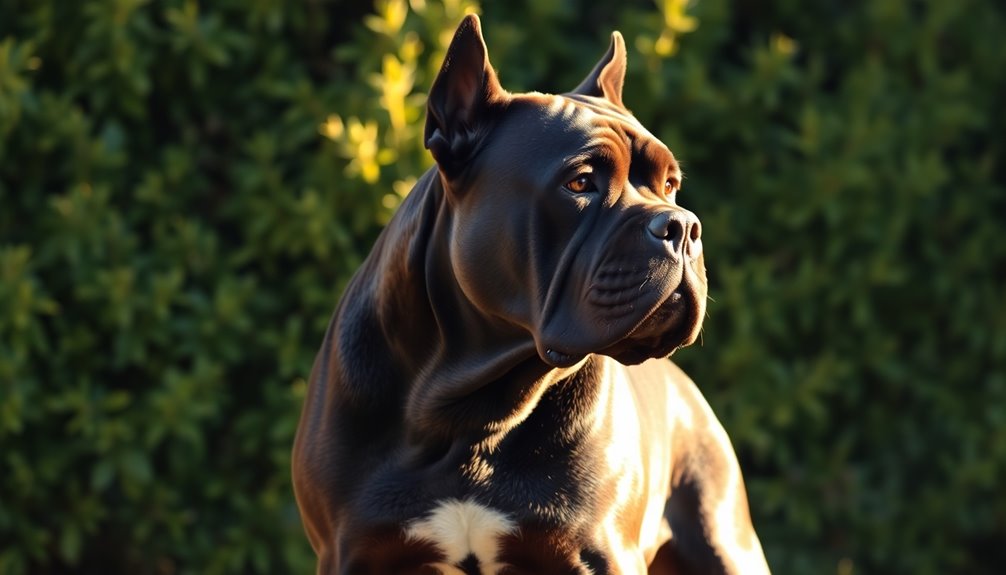
The Cane Corso's protective and watchful demeanor makes them an excellent choice for families seeking a loyal companion. While they can form strong bonds with family members, it's essential to consider how they interact with other pets and strangers. Understanding their temperament will help you create a harmonious living environment for everyone involved. Early training is crucial, as these dogs are known for their independent nature, which can lead to dominant behavior if not properly managed.
Protective and Watchful Demeanor
With a natural instinct for protection, Cane Corsos stand out as vigilant guardians of their families and homes. Bred for centuries to defend, they possess a strong protective instinct, always alert and watchful. You'll find them quick to react against perceived threats, making them effective deterrents due to their size and formidable strength, including a bite force estimated at 700 PSI.
Their loyalty runs deep, forming strong family bonds that make them devoted companions. While they may appear intimidating, they're affectionate with their loved ones and thrive on human interaction. However, be mindful that they often distrust strangers and other pets; this behavior can be mistaken for aggression if they're not properly socialized. Additionally, their stocky and muscular build not only enhances their intimidating presence but also contributes to their effectiveness as protection dogs.
Cane Corsos assert themselves when necessary, showing a confident and independent nature. Their assertiveness ensures they're prudent about whom they engage with, making early socialization crucial. With consistent training, you can channel their protective instincts positively, transforming them into reliable guardians. In your home, a Cane Corso will always prioritize your safety and well-being, creating a watchful yet loving presence.
Suitability for families, individuals, or other pets
Cane Corsos make excellent companions for families and individuals alike, but their temperament requires careful consideration. Their loyalty to family members is unmatched, forming deep bonds and offering fierce protection. However, they're best suited for households with older children due to their size; young children should always be supervised around them.
An affectionate nature emerges with proper socialization, but they need ample space—small apartments won't suffice. Cane Corsos typically require a high level of exercise to stay happy and healthy, making outdoor activities essential for their well-being.
For individuals, Cane Corsos exhibit independent behaviors and can assert dominance if not trained correctly. They require significant exercise and mental stimulation to prevent boredom. With their intelligence, they're trainable, but they thrive under experienced owners who can provide consistent leadership.
When it comes to other pets, Cane Corsos can coexist well if introduced properly. Early socialization is crucial to mitigate potential aggression or territorial tendencies.
They can develop dominance issues if not raised with other animals or if a dominant dog is already present. While they may not be the most social dogs, their affectionate nature towards family members shines through, making them a great choice for those who understand their unique needs.
Health and Lifespan
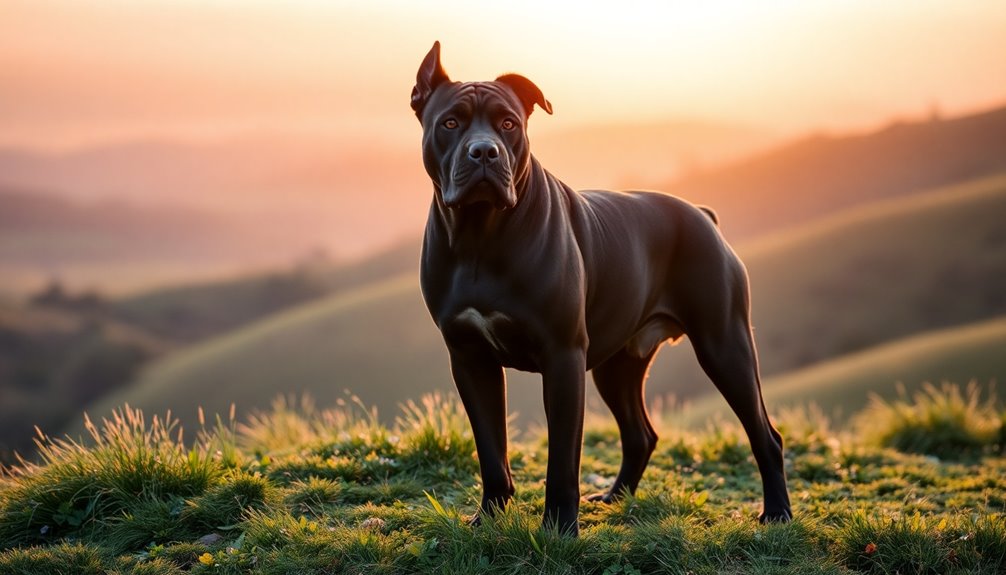
When it comes to your Cane Corso's health and lifespan, understanding their average lifespan of 9 to 12 years is just the beginning. It's important to be aware of common health concerns like hip dysplasia and heart conditions that can affect your dog. Additionally, studies have shown that their lifespan can vary based on color variations, with black brindle and brindle dogs typically living longer than those of other colors.
Typical lifespan of the breed
The typical lifespan of a Cane Corso ranges from 9 to 12 years, a common span for large breeds. A study conducted in 2017 found that the median lifespan is approximately 9.29 years. With proper care, some Cane Corsos can even live into their early teens, but various factors can influence their longevity.
Genetics plays a significant role in how long your Cane Corso will live. A high-quality, age-appropriate diet is crucial, along with regular veterinary care to catch potential health issues early. Routine vaccinations and parasite control are also essential for maintaining their health.
Environmental conditions also matter—ensure your dog has adequate shelter and isn't exposed to harmful substances.
Larger breeds like Cane Corsos tend to have shorter lifespans compared to smaller dogs. Their size and physical characteristics can predispose them to certain health issues.
To support their health, provide a balanced diet designed for large breeds, and ensure they get regular exercise. Daily walks and playtime are vital for both physical and mental well-being.
A safe and stimulating environment will help your Cane Corso thrive, reducing stress and preventing injuries, ultimately contributing to a longer, healthier life.
Common health concerns or genetic predispositions
Many Cane Corso owners face common health concerns that can significantly impact their dogs' quality of life and lifespan.
One of the most prevalent issues is joint and musculoskeletal problems, particularly hip and elbow dysplasia. These genetic conditions can be worsened by factors like poor diet and excessive activity during rapid growth, leading to osteoarthritis and chronic joint pain. Mandatory hip radiographs for breeding stock are required at a minimum age of 2 years to help identify these issues early.
Neurological conditions such as epilepsy also pose risks. While the mode of inheritance isn't fully understood, breeding caution is crucial, especially with dogs related to affected individuals.
Eye problems are another concern, including Canine Multifocal Retinopathy and entropion. Regular ACVO eye exams can help catch issues early.
Additionally, you should be aware of other potential health issues like bloat, demodectic mange, and autoimmune thyroiditis.
Allergies and food intolerances may require careful dietary management to keep your Cane Corso healthy.
Being informed about these common health concerns allows you to take proactive steps in caring for your Cane Corso, ensuring a longer and healthier life together.
Tips for maintaining health and wellness
Maintaining your Cane Corso's health and wellness is essential for a long, happy life together. Start with a high-quality diet that meets AAFCO standards, focusing on high-quality proteins and healthy fats. Incorporate carbohydrates like sweet potatoes or brown rice, and don't forget fruits and veggies for vital nutrients.
Avoid feeding table scraps and limit treats to prevent obesity.
Exercise is crucial, too. Aim for about 60 minutes of activity each day, dividing it into two 30-minute sessions. Engage in brisk walks, jogs, fetch games, or swimming, which is excellent for joint health.
Tailor exercise routines based on your dog's age and energy level.
Regular veterinary care is another vital aspect. Schedule check-ups every 6-12 months for early detection of health issues and keep vaccinations up-to-date. Preventive medications for parasites are essential, as are regular dental check-ups.
Lastly, pay attention to grooming and lifestyle. Brush your Cane Corso weekly, bathe them every 6-8 weeks, and trim their nails regularly.
Create a comfortable sleeping environment and ensure they've a secure space to play, promoting a healthy and active lifestyle.
Care Requirements
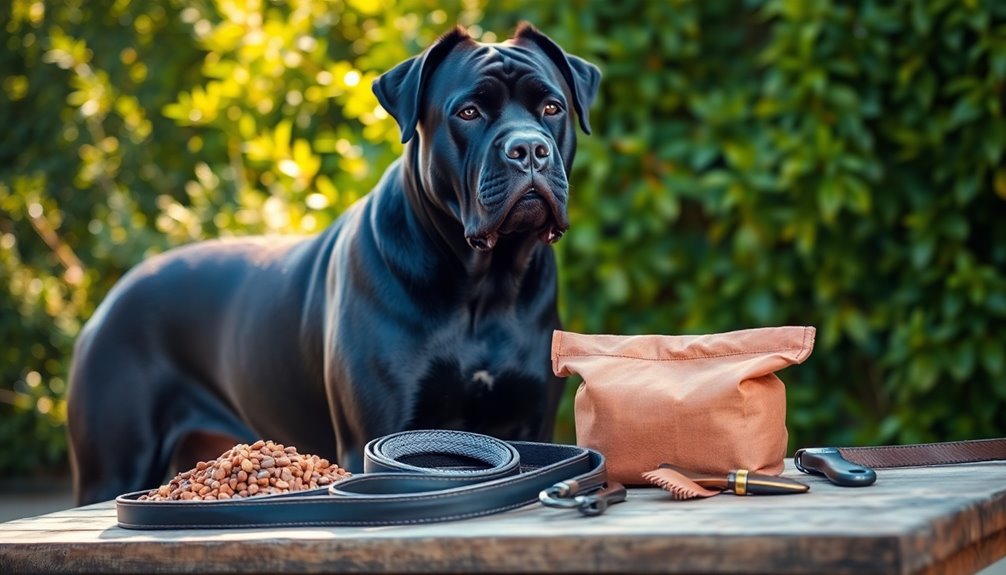
To keep your Cane Corso healthy and happy, you need to focus on a few key care requirements.
Regular brushing, proper exercise, and a balanced diet play crucial roles in their well-being. Daily exercise needs of 1 to 2 hours are essential to maintain their physical and mental health.
Let's explore the optimal brushing frequency, exercise needs, and feeding tips to ensure your furry friend thrives.
Brushing Frequency for Optimal Coat
Regular brushing is essential for keeping your Cane Corso's coat healthy and vibrant. You should brush your dog 3 to 4 times a week to effectively remove loose hairs and maintain that shiny appearance. During shedding season, it's best to brush daily to manage the extra fur that can accumulate around your home.
For brushing, use a bristle brush or a rubber grooming mitt for regular maintenance. A shedding rake or shedding blade works wonders for removing larger tufts of hair, while a hound glove can be a gentle alternative. Each tool serves a specific purpose, so choose one that fits your needs.
Regular brushing not only reduces shedding but also helps distribute natural oils throughout the coat, promoting a clean and healthy look. It prevents hair from gathering on your furniture, making your home tidier. Additionally, establishing a grooming routine can enhance bonding and make sessions enjoyable for both you and your dog.
In addition, brushing encourages new hair growth, ensuring that your Cane Corso's coat stays in top condition. Incorporate brushing into your grooming routine to enjoy the benefits of a well-kept coat and a happy, healthy dog!
Exercise requirements and energy levels
Cane Corsos thrive on an active lifestyle, needing about 1 to 2 hours of exercise each day to stay happy and healthy. Incorporate long walks, running, playing fetch, and agility training into their routine. These activities not only provide physical exercise but also stimulate their minds, so mix in training sessions and problem-solving games to keep them engaged.
Adjust the exercise duration and intensity based on your Cane Corso's age. Puppies require shorter, more frequent sessions, while adults can manage vigorous activities. Seniors benefit from lower-impact exercises that maintain their mobility.
Consistency is key; a regular exercise routine helps manage their energy levels and can prevent behavioral issues stemming from boredom. Consider activities that promote endurance and strength, like weight pulling and swimming, which is great for joint health. Additionally, regular exercise is essential for preventing obesity-related health issues, which can significantly affect their well-being.
Interactive play with other dogs and community walks also enhance their socialization. Always monitor their exercise intensity to prevent overexertion and ensure they stay hydrated. A well-exercised Cane Corso will be a happier, healthier companion, and your bond will strengthen through shared activities.
Feeding tips and diet recommendations
Feeding your Cane Corso properly is essential for their overall health and well-being.
Start with puppies aged 2 to 6 months; they need 3 to 4 meals a day, totaling 3-4 cups of high-quality puppy food. Focus on highly digestible proteins and prebiotics for digestion.
As they transition to adolescence (6 months to 1 year), reduce meals to 2-3 times daily and increase food to 4-6 cups, emphasizing protein and dietary fiber. Activity levels significantly influence their daily food requirements, so adjust accordingly.
Once your Cane Corso reaches adulthood (1 year and up), feed them twice a day with 4 to 6 cups of adult dog food. Ensure a balanced diet with quality animal protein, healthy fats, and controlled carbohydrates.
For seniors (8 years and older), continue feeding twice daily, but adjust to 3-5 cups of senior food, focusing on fiber and essential nutrients to manage their metabolism.
Always avoid human foods and fatty snacks, as they can lead to obesity.
If considering a raw or vegetarian diet, consult your vet to ensure nutritional balance.
Monitoring their weight and activity level will help you adjust their diet effectively.
Training and Socialization
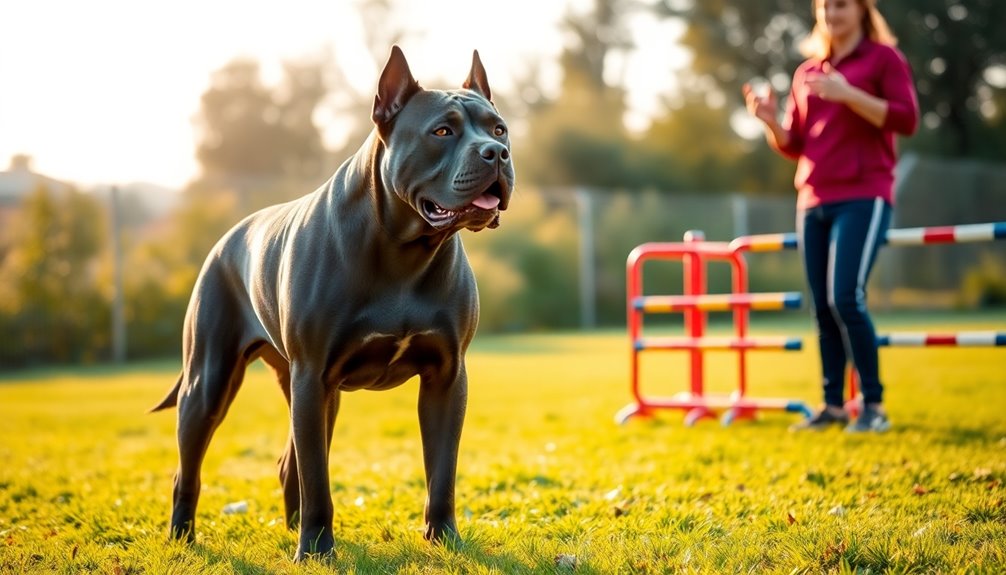
Training your Cane Corso starts with understanding their moderately responsive nature to commands. Gradual exposure to new environments is key, as it helps them adapt and reduces leash reactivity in unfamiliar settings. To enhance their learning experience, focus on consistent routine during training sessions to build security and trust.
Moderately Responsive to Commands
When you're working with a Cane Corso, it's essential to understand that they can be moderately responsive to commands. This means you'll need to adopt effective training techniques to get the most from your dog.
Start with positive reinforcement methods like treats, praise, and toys to reward good behavior. Always reward your Cane Corso immediately after they complete a task, helping them associate the action with the reward.
Keep training sessions short, engaging, and fun to prevent boredom. Focus on basic commands such as sit, come, stay, down, and leave it, as these form the foundation for advanced commands. Regular practice, particularly between 16 weeks and 6 months, is crucial for reinforcing obedience. Consistent potty training(maintain a strict schedule for taking the puppy outside) is also important as it helps establish a routine and reinforces good habits.
Additionally, establish clear leadership by having your dog sit before meals or going out the door. Early socialization is vital; it helps your Cane Corso become a well-adjusted adult, making them easier to train and a better companion.
Don't forget to combine exercise with training drills to keep their minds engaged. With patience and consistency, you'll see improved responsiveness in your Cane Corso.
Gradual Exposure to New Environments
Gradually exposing your Cane Corso to new environments is crucial for their development and socialization. Start during the puppy stage, ideally within the first 16 weeks of life, as this is when they're most receptive to experiences.
Begin with calm, less crowded settings, allowing your pup to acclimate without feeling overwhelmed. Use positive reinforcement—like treats, praise, and affection—to reward calm behavior in these new environments. Additionally, ensure that you provide consistent socialization opportunities to promote long-term adaptability in various situations.
As your Cane Corso becomes more comfortable, gradually increase the complexity of the settings. Move from quiet parks to busier areas, ensuring you avoid overwhelming situations that could lead to anxiety.
Introduce new sights, sounds, and smells systematically to help your dog feel secure.
Leash Reactivity in Unfamiliar Settings
Leash reactivity can be a frustrating challenge for Cane Corso owners, but understanding its roots and implementing effective strategies can make a significant difference. This behavior often stems from insufficient socialization, so starting early is crucial.
Introduce your Cane Corso to various environments, people, and other dogs within the first 16 weeks to build confidence and reduce fear. Distance is important in training, as being too close to triggers can lead to reactivity. Additionally, providing safe environments during initial socialization can help your dog feel more secure and less anxious.
When your dog reacts during walks, identify specific triggers—unfamiliar people or animals—and develop a plan to expose your dog gradually. Use positive reinforcement techniques to reward calm behavior. Treats can help create positive associations with these triggers.
For instance, teach your dog to look at you when encountering a trigger, rewarding the "check-in" with a treat.
Leash training is equally important. Begin with short walks in quiet areas, using treats to keep your dog's focus. Practice basic commands like "sit" and "stay" in different locations to reinforce learning.
Remember to be consistent and patient, as Cane Corsos can be stubborn. Proper training and socialization can help manage and prevent reactive behaviors, ensuring enjoyable outings for both you and your dog.
Ideal Living Environment
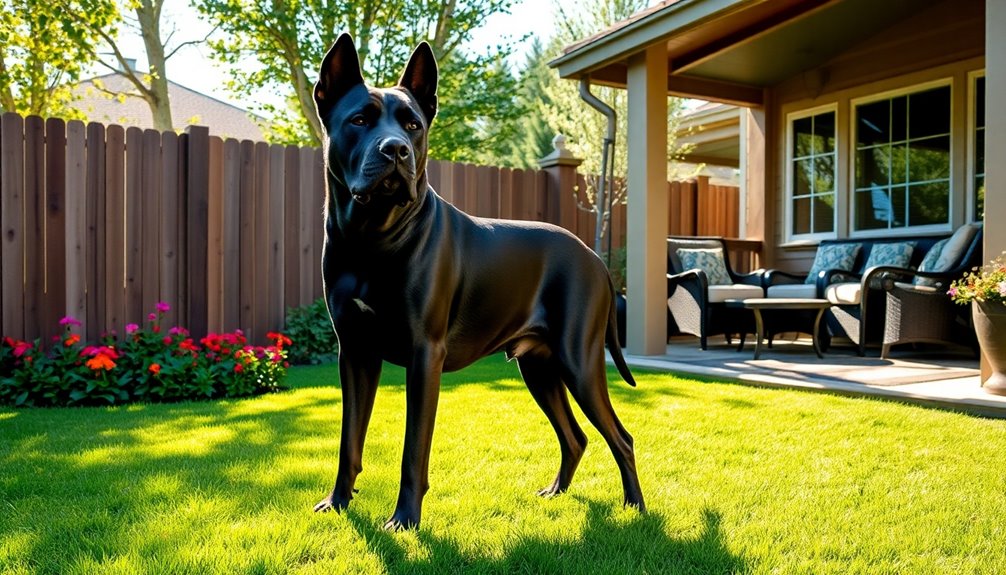
When it comes to the ideal living environment for your Cane Corso, a spacious fenced backyard is a must. They thrive in moderate climates and can struggle with extreme heat or humidity, so you'll need to ensure they've a comfortable, shaded area to relax. Additionally, it's important to note that Cane Corsos can develop thicker coats in colder conditions, which can aid their adaptability to different climates. Providing the right space and climate will help keep your dog happy and healthy.
Spacious Fenced Backyard Preferred
A spacious, fenced backyard is essential for a Cane Corso's well-being, providing the necessary room for movement, play, and exploration. Your home should have enough space for the dog to roam comfortably, allowing for frequent play and activities.
A securely fenced yard is ideal, ensuring your dog's safety while they enjoy the outdoors without constant supervision. Having a fenced area helps prevent your Cane Corso from escaping or encountering hazards, defining a secure space for exercise. Additionally, because Cane Corsos have protective instincts, it's important to create a welcoming environment for them to feel secure while in the yard.
It's crucial to engage your dog in physical activities like running or playing fetch, which helps to prevent boredom and destructive behavior. Cane Corsos require regular exercise, ideally around two miles of walking each day, and they thrive in an environment where they can explore and play.
Outdoor activities enhance their mental stimulation, so consider incorporating new toys or games to keep them engaged. Make sure to remove potential hazards from the backyard, such as sharp objects or toxic plants.
Heat Tolerance and Humidity Sensitivity
To ensure your Cane Corso thrives, it's crucial to create an ideal living environment that accommodates their heat tolerance and humidity sensitivity.
These dogs are highly susceptible to heat, so avoid intense exercise during peak hours. Instead, opt for early morning or late evening walks. Provide cooling measures like cold towels, cooling mats, or a dog pool, but steer clear of cold water, which can worsen their condition. Always monitor for signs of overheating, such as excessive panting or elevated body temperature. Dogs cannot sweat, so they rely on external help to cool down.
Hydration plays a key role in keeping your Cane Corso healthy in warm weather. Ensure fresh water is always available, especially in summer, and place it in shaded areas to prevent it from heating up. Regularly check water levels and maintain room temperature.
Humidity can also pose challenges, leading to skin issues. Regular grooming is essential to prevent matting and irritation, so brush their coat often and consider using dog-safe moisturizers.
Create cool indoor spaces with fans or air conditioning and provide shaded outdoor areas for refuge from the sun. By being proactive, you can help your Cane Corso stay comfortable and healthy in varying climates.
Cane Corso's Impressive Bite Force
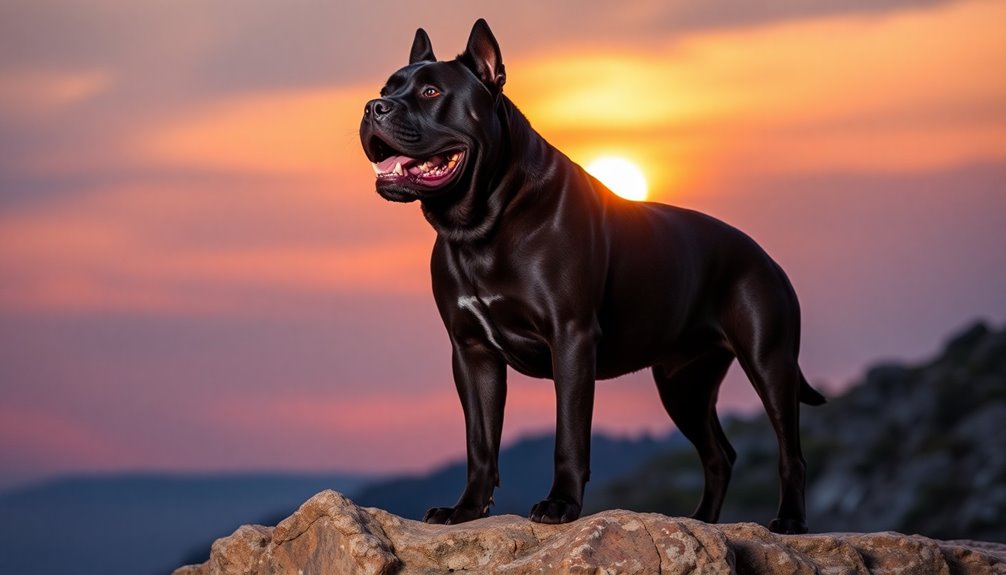
When you think about the Cane Corso, it's hard to ignore its impressive bite force, rooted in its lineage as an ancient Roman war dog. These dogs weren't just companions; they were guardians of Roman gladiators, designed to protect and exert significant power. Understanding this history gives you insight into the strength and capability of the Cane Corso today. With a bite force estimated between 300-400 PSI, the Cane Corso ranks among the strongest dog breeds, highlighting its potential for serious harm if not properly trained and socialized.
Ancient Roman War Dog Lineage
The Cane Corso's impressive bite force stems from its ancient lineage as a Roman war dog, bred for strength and resilience. With an estimated bite force of around 300–400 PSI, some sources even suggest figures reaching 700 PSI, though those claims likely exaggerate the true power. Regardless, this breed's bite force surpasses that of a Pit Bull, which is around 242 PSI, and is comparable to a lion's force of around 600 PSI.
Factors like size, muscular build, and jaw structure contribute to the Cane Corso's powerful bite. Its broad, square-shaped muzzle supports strong jaw muscles, while genetics and overall health can affect individual bite strength. Additionally, the Cane Corso's average bite force is a critical aspect of its anatomy, emphasizing its formidable presence among dog breeds.
Though training and socialization don't directly influence bite force, they're crucial for managing the dog's behavior. This strong bite force makes the Cane Corso well-suited for hunting and guarding, reflecting its protective instincts rather than aggression.
However, as an owner, you must recognize the responsibilities that come with such strength. Practicing safe handling around your Cane Corso is essential to ensure a positive relationship with this remarkable breed.
Guardians of Roman Gladiators
Cane Corsos, known as guardians of Roman gladiators, possess a remarkable bite force that reflects their heritage as formidable protectors. With an estimated bite force ranging from 300 to 400 PSI, these dogs are significantly stronger than breeds like Pit Bulls and German Shepherds.
While some exaggerated claims suggest a bite force of up to 1,600 PSI, the scientific consensus maintains that their true strength lies in the robust anatomy and musculature of their jaws. The Cane Corso's strong bite force serves as both a testament to their physical capabilities and a reminder of the responsibility that comes with owning such a powerful breed.
The Cane Corso's broad jaws and powerful muscles contribute to their impressive bite, making it essential for owners to manage their strength responsibly. Factors such as size, genetics, and age can influence the bite force, but they remain one of the strongest breeds.
For context, a wolf's bite force measures around 398 PSI, showcasing just how powerful these dogs are.
As a potential owner, understanding the implications of this bite force is crucial. While they're not the most frequent attackers, their bites can lead to severe injuries. Proper training and socialization are vital to ensure these magnificent guardians remain safe and well-behaved companions.
Ideal for Active Owners?
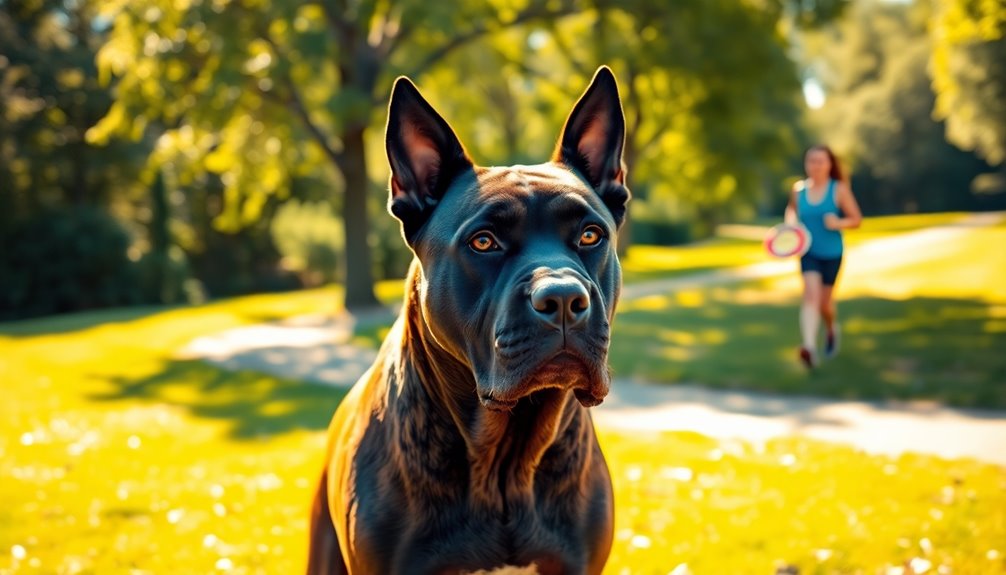
If you're an experienced handler ready for a challenge, a Cane Corso might be the perfect fit for you.
These dogs require a solid commitment to daily exercise, demanding one to two hours of activity to keep them happy and healthy. Engaging in various adventure exercises is essential to ensure they receive both physical and mental stimulation.
If you lead an active lifestyle and can provide the structure they need, you'll both thrive together.
Best for Experienced Handlers
Often regarded as a breed for seasoned handlers, Cane Corsos thrive in environments where experienced owners can provide firm, consistent training. Their dominant nature can be challenging, so you'll need to employ early socialization and positive reinforcement methods to manage their assertiveness. Notably, breeders like Alcor Cane Corso, known for their world-class breeding, focus on producing dogs with stable temperaments that are ideal for training.
Consistent training is essential to prevent them from developing dominance in your household. These intelligent dogs are eager to please, making them generally easy to train, but they respond best to positive methods. Tailoring training programs to address specific issues and characteristics is vital for success.
Follow-up visits and continued training at home ensure they remain well-behaved over time. While Cane Corsos can be loyal family members, they may not be suitable for homes with small children or multiple pets without proper introductions and supervision.
A securely fenced yard is crucial for their safety, given their protective instincts. If you're an active owner who can provide the necessary mental and physical stimulation, including puzzle games, you'll find that Cane Corsos can thrive.
Just be prepared for their needs, and you'll foster a strong bond with this devoted guardian.
Commitment to Daily Exercise
For active owners, committing to daily exercise is vital for a Cane Corso's well-being. This breed requires 1 to 2 hours of exercise each day, ideally split into multiple sessions. You can take your Cane Corso on brisk walks, jogs, or even running. Incorporating playtime keeps things engaging, providing both physical and mental stimulation.
Variety is key—mix endurance activities like long walks with strength exercises such as weight pulling or agility training. Don't forget about mental challenges; training exercises, obedience commands, and puzzle toys can keep your dog's mind sharp. Socialization through community walks or play sessions with other dogs also plays an important role. Additionally, regular exercise helps prevent obesity and improves your dog's overall health.
Be mindful of your dog's age; puppies need shorter, frequent sessions, while seniors require less intense exercise. Always monitor your Cane Corso for signs of fatigue or discomfort, adjusting as necessary.
Consistent routines help manage energy levels and mitigate potential behavioral issues. Lastly, adapt your exercise plans based on environmental factors, like avoiding excessive heat. By prioritizing daily exercise, you'll ensure your Cane Corso remains healthy, happy, and well-adjusted.
Frequently Asked Questions
How Much Do Cane Corsos Typically Weigh?
Cane Corsos typically weigh between 85 and 110 pounds, depending on their gender. Males usually range from 99 to 110 pounds, while females generally weigh between 85 and 99 pounds.
Their growth stages show significant weight changes, with males reaching 60-65 pounds at six months and females around 55-60 pounds.
Factors like genetics, diet, and exercise play crucial roles in determining their final weight, so managing these aspects is essential for their health.
Are Cane Corsos Good With Children?
Cane Corsos can be great with children if you train and socialize them properly.
They're loyal and protective, often showing gentleness towards family members.
However, their large size means you'll need to supervise interactions with young kids to prevent accidents.
Early socialization is key to ensuring they're comfortable around children.
What Grooming Needs Do Cane Corsos Have?
Cane Corsos require regular grooming to keep their coat healthy and skin in good condition.
You should brush them at least once a week with a firm bristle brush or grooming mitt to manage shedding.
Bath them every 6 to 12 weeks, using a dog-specific shampoo.
Don't forget to check their ears, teeth, and nails regularly.
Trimming nails every 3-4 weeks and maintaining dental hygiene are crucial for their overall health and comfort.
Do Cane Corsos Shed a Lot?
Yes, Cane Corsos do shed quite a bit, particularly during seasonal changes.
You'll notice increased shedding in the spring and fall when they transition their undercoat. Their short coat makes shedding less visible, but you'll still find hair around your home.
To manage this, brush them regularly, especially during peak shedding times. Proper diet and exercise can also help control shedding, so keep an eye on their health and grooming routine.
How Long Do Cane Corsos Usually Live?
Cane Corsos usually live between 9 and 12 years, with a median lifespan of about 9.29 years.
You'll find that their lifespan can vary based on genetics, diet, and overall health. Providing a high-quality diet, regular exercise, and good veterinary care can help them live into their early teens.
Keep an eye on common health issues like hip dysplasia and bloat to ensure your Cane Corso stays healthy and happy throughout their life.
Conclusion
In summary, the Cane Corso is an incredible companion for those who lead an active lifestyle. With its rich history, impressive physical traits, and strong personality, this breed thrives in dynamic environments. Proper training and socialization are key to ensuring a well-behaved pet. If you're ready to commit to their needs, the Cane Corso can be a loyal guardian and loving family member. Embrace the challenge, and you'll find a devoted friend for life!

